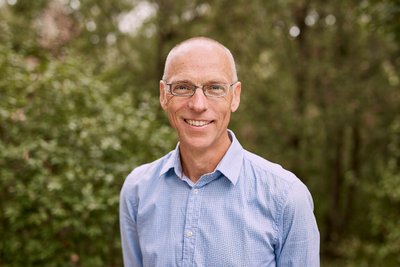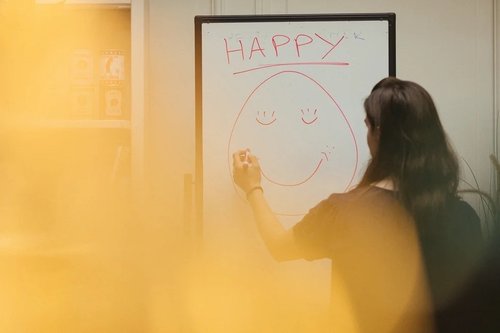Beyond capitalism: How to find purpose in your personal myth
Jul 08, 2022
7 mins


In the third article in our series about finding purpose, transition guide Martin Cadée tells us to embrace the world of symbols.
Our sense of purpose is an essential compass when making career choices. It’s helpful to discern three levels of purpose: default purpose, created purpose, and authentic purpose — a distinction introduced by Jonathan Gustin, founder of the Purpose Guides Institute. Default purpose is the life script we adopt from our parents, culture, society, and upbringing. Once we become aware of that script, decide to move beyond them, and start learning the rules of the game of work and career, we find our created purpose — to play a meaningful role in our society.
Lastly, once we start to question the rules of the game and ask ourselves if we truly want to play along, we start looking for our authentic purpose, our true, unique purpose, or some say our ‘soul purpose.’ It’s a feeling that comes from the inside, from our unique nature, connecting to society from that place, looking for where it can serve best.
This distinction of default, created and authentic purpose fits very well into the theater metaphor I introduced in the first article: viewing our society as a play acted out on the only stage that exists, Mother Earth. Our default purpose and created purpose are firmly rooted in the main play — the main narrative — which, as I’ve previously written, is based on market capitalism and growth. In that sense, default and created purpose are answers to that question society always asks, explicitly or implicitly: ”What role will you play in this theater piece?” It’s only when we truly connect to an authentic purpose that we can move beyond the grip of the status quo.
As the theater play we’ve created is failing us and the earth on so many levels — the wealth gap widening, the air we breathe thickening, ecosystems deteriorating — this topic seems urgent. As I wrote in the first article of this series: “It is absolutely essential that we truly step out of the play; that we listen to our inner voices in a language different from the one we were educated to use.” Real change can only happen if we find inspiration beyond the play and change the story from the inside.
Hence this isn’t an article about climbing the career ladder and finding purpose and meaning in playing a new, more prestigious role. Rather, this is an article about the journey of bringing authentic purpose to the play as a way to live a fulfilling and contributing life, to bring about change. Finding the place, as the American theologian Frederick Buechner writes, “where your deep gladness and the world’s hunger meet.”
So how do we connect to authentic purpose?
We need to find and use a language that reaches beyond the dominant paradigms of success, growth, careers, and jobs. There are many ways to do this, including working with your body, artwork, conscious travel outside of your own culture, and journeying into nature. But for this article I want to specifically introduce ‘symbolic listening,’ as the concept is one of the easier ones to explain in writing.
In his book ‘The Soul’s Code,’ James Hillmann introduced the ‘acorn theory’ of our human uniqueness. In short, it comes down to the idea that everyone is born with a unique gift, a unique way of being in the world that, when granted the right environment and circumstances, can fully flourish in one’s life. Much like an acorn possessing the potential of becoming an oak tree — and not an aspen or an almond tree.
This concept is built on the earlier idea introduced by Carl Jung, that we all live by a personal myth. The acorn, or the myth, are our own unique stories that are in continuous conversation with the outside world. The more we get sucked into the stories defining success and progress in our culture, the more difficult it is to identify our own unique quest.
The more we get sucked into the stories defining success and progress in our culture, the more difficult it is to identify our own unique quest.
As such, reconnecting to your personal myth is a way to listen beyond the status quo of your life to instead find your unique journey — and identify your next step in line with that vision. Being more conscious about this personal myth will make your choices come more from the inside; in other words, your path will be less influenced by the expectations of people around you and the story of success in society. It’s like the acorn becoming conscious about which soil will nourish it best to grow into the full oak tree it senses it can be.
So how do you start connecting to that personal myth and understand your next step?
Uncovering your personal myth
I invite you to make a collection of important moments and elements in your life: the successes and excitement, the moments of flow, the setbacks, the wounds and pains, big dreams, important encounters, charged places and symbols. It can be really helpful to do this on a big empty paper on the wall and to take some time collecting, maybe you want to even do it over a few days. If you want to get creative, you can even look for images and make a collage.
Then create a myth-like story that includes these moments and elements. When I say myth I don’t mean ‘fake,’ but rather a powerful tale with meaning on a symbolic level. To help you get into that imaginative space, you can choose an animal as the main character, place the story in another land or world far, far away and play with the chronology of the story. So what you’re writing here is not a biography in a fairy tale, but a mythical story of the current beneath the surface of your everyday life.
By writing our own story in this way we can start to sense our authentic purpose and understand how it has interacted with the world around us, often since we were very young. We can start to discern between our inner voice and the voice of the theatre play — between what is really authentically ours and what has been imposed by culture and society.
As an illustration, I’ll share the story of Maria, one of my clients. She grew up in a small town far away from the hustle and bustle of the big city. As a kid, she loved putting up small theater performances to make people laugh. Once she started school, her parents and teachers told her to get the best grades possible — theater, however, didn’t really have a place at her school, and so Maria slowly forgot about that part of herself. When she wrote her personal myth many years later, while she was recovering from a burnout after years as a successful marketing consultant, it came out as a story about a red flower that was forced to be white. The bees loved the white flower and she learned many things about bees and how to make them happy. At the same time, many other insects were avoiding her, but she didn’t care, because the bees were so happy. Until one year, when she by accident grew one red petal and the bees started avoiding her and other insects started to come. The story continues and becomes more complicated, but you get the idea.
This uncovering of your personal myth can be hard work: it can be challenging to listen beyond the stories we’ve grown up with, to instead trust our own ‘knowing’ that exists underneath those stories. It really does help to have a guide who can support you to listen as deeply as you can, or a community of people exploring the same parts of themselves. That being said, here are two questions that can help you deepen your understanding of your personal myth:
What are the qualities of the protagonist in your myth? What is your ‘medicine’?
The main character of your story will probably have a particular quality, a particular gift that reveals itself in the narrative. Maybe it’s a quality that isn’t allowed or recognized at first; maybe it needed to be hidden until today. But as this is a story about you, this is about the gift that you carry. Some indigenous tribes speak of this as your ‘medicine.’ In the story of Maria, there was something specific about the color red. To her, it signified bringing happiness and laughter, and with that, connecting to the joy of life.Where to serve? Who are your people?
Medicine isn’t good in and of itself — it needs to serve. The question is who and where? Maybe you find clues in your myth, or maybe in your actual story. If not, a question to ask yourself could be: What do I see in the world that really makes me come alive? And what breaks my heart?
In Maria’s myth, the new red flowers she eventually grew had white spots that still attracted the bees, albeit hesitantly in the beginning. She realized ‘her people’ are the bees after all — they represented all those fully engaged in the business of work and career and who, in consequence, so often lost connection with life. Maria understood that to connect with her people and bring her gift to them, she needed to keep speaking their language (the white spots) in order to let them experience “the red” — that there is so much more to life.
And now back to work: How do these insights inform your next step? Well, you don’t go into a job interview talking about the ‘medicine’ you’re ready to offer. So how to bridge the symbolic realm and daily life?
David Whyte wrote in his beautiful poem ‘What to remember when waking’: “…to be human is to become visible while carrying what is hidden as a gift to others…” In a way, that sentence says it all. This sense of purpose isn’t one to put on your résumé, but rather a deep knowing to carry with you in whatever you do. It’s the source that helps you confront the many questions and challenges presented by life, including your next career choice.
Maria’s insight made her change careers. She realized her calling was to help people feel what she called ‘real life.’ So instead of creating marketing concepts, Maris is now experimenting with different ways of doing just that: she started a new role in her old company, training and mentoring the junior consultants. At the same time she’s taking a course in public speaking to perhaps one day go off on her own to inspire bigger groups of people.
As I wrote in the first article of this series: If you don’t have your own purpose entering a workplace, you’re giving that organization a lot of power, and you become too dependent. Of course, this is also true if you swap the word “organization” for “society” or “culture.” So here’s my invitation to you: instead of asking yourself ‘what is my next career step?’ ask yourself a more powerful question: What is my unique story and what is my most meaningful, fulfilling next conversation with the world?
Photo: Welcome to the Jungle
Follow Welcome to the Jungle on Facebook on LinkedIn and on Instagram and subscribe to our newsletter to get our latest articles every day!

More inspiration: Martin Cadée
Transition Guide and Organizational Culture Alchemist

I’ve lost purpose in my work: what now?
Sometimes it’s worth taking a bit more time sitting with the discomfort, not yet knowing where to go next.
Jan 04, 2022

What’s your purpose? Moving beyond the ‘Why?’
“Why do you do this work?”, “Why do you want to move on?”. Work is a continuous invitation, within your possibilities, to grow as an “actor”...
Nov 23, 2021

Advice for people pleasers: Breaking free from being “too nice” at work
Do you often say things like, "Yeah, sure, I can do that!" when in fact you don't have the bandwidth to do that? We've got you.
Dec 12, 2024

There’s no place like home: Does relocation hurt productivity?
Relocating often brings homesickness, but it’s part of the journey. Here’s how to embrace the change and make the most of it.
Oct 22, 2024

Should you take your office crush to the next level?
Is an office crush worth the risk, or more damaging to your career and reputation than you think?
Oct 09, 2024
The newsletter that does the job
Want to keep up with the latest articles? Twice a week you can receive stories, jobs, and tips in your inbox.

Looking for your next job?
Over 200,000 people have found a job with Welcome to the Jungle.
Explore jobs